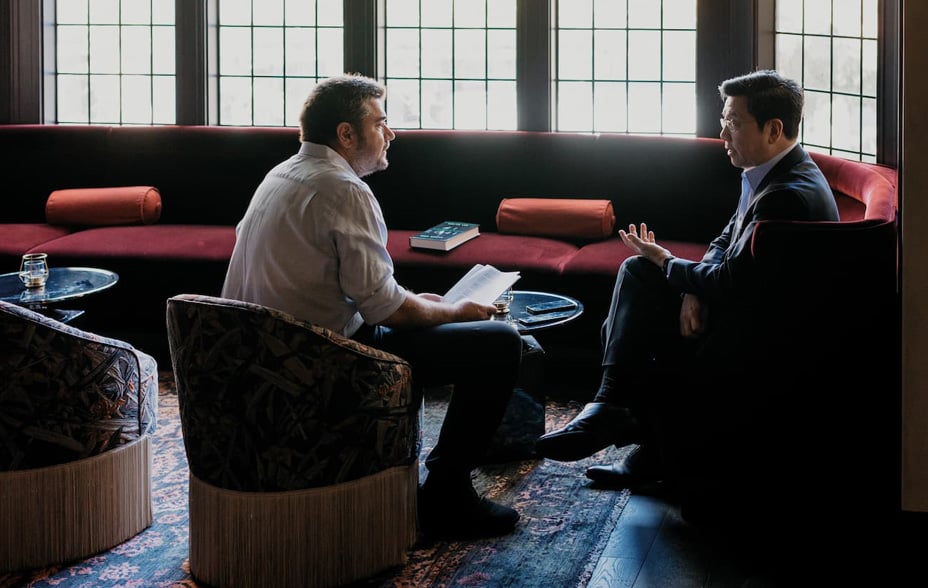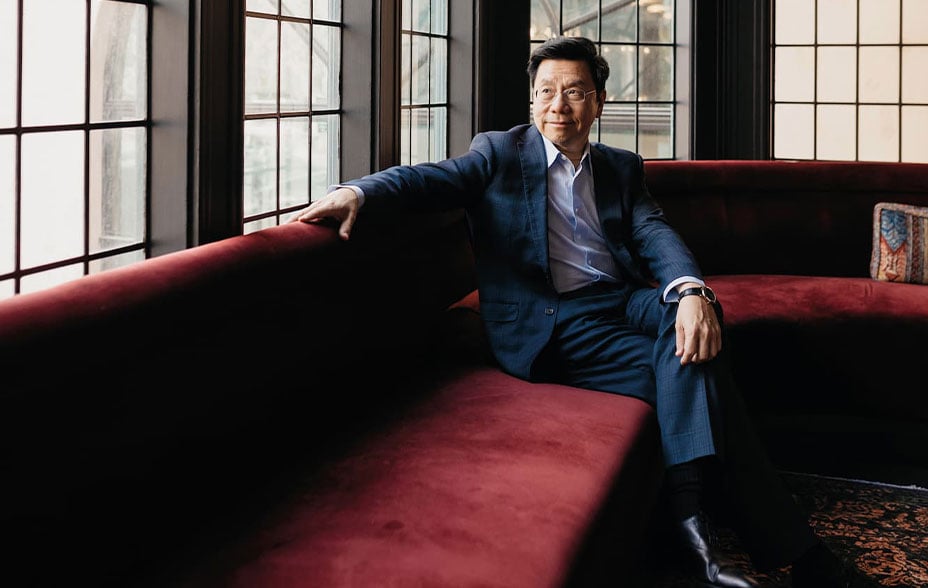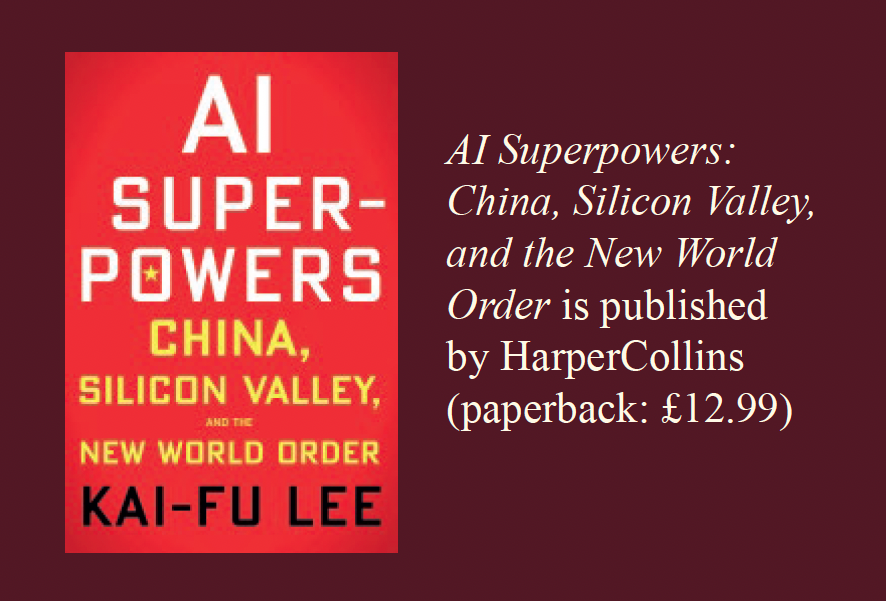
Photography by Boris Zharkov
This article originally featured in Baillie Gifford’s Spring 2023 issue of Trust magazine.
It’s been five years since Kai-Fu Lee published AI Superpowers: China, Silicon Valley, and the New World Order. It quickly became a must-read among technologists, policymakers and investors alike.
The book suggested that AI’s 2017 victory over the Chinese world champion of Go – the ancient east Asian board game – had been a wake-up call. Perceiving an existential threat, the Chinese government declared that the country would become artificial intelligence’s global leader by 2030. Moreover, Lee suggested it had a good chance of achieving the goal.
“In the age of AI, where data is the new oil, China is the new Saudi Arabia,” he wrote. His point was that having so much data to train on conferred a major advantage. China’s scrappy entrepreneurial culture and high tolerance for risk, he added, would turbocharge its progress.
My old friend and mentor Kai-Fu was uniquely placed to write the book. Born in Taiwan but raised in the US, he studied machine learning and pattern recognition long before those subjects became fashionable. He went on to work at Apple and Microsoft before a four-year stint as the president of Google’s China division.
In 2009, he set up Sinovation Ventures, a venture capital company focused on investing in Chinese startups. I worked alongside him there, first in Beijing and later in San Francisco, for about a decade.

Chris Evdaimon talks with Kai-Fu Lee at the El Prado Hotel in Palo Alto, California
We last met in 2019 when he encouraged me to join Baillie Gifford. Scottish Mortgage had invested in two of Sinovation’s funds a few years before. We’ve spoken since via Zoom, but it feels great to catch up in Silicon Valley’s Palo Alto.
The new oil
It’s probably his 10,000th interview, but it’s my first in the questioner’s chair, and I’m curious to know whether he maintains his earlier beliefs.
“I certainly stand by the point that data is the new oil. It is the fuel for any company to get ahead,” Lee tells me.
“At the time I wrote the book, two major factorsdrove the data explosion: the number of people in China rapidly coming online and the fact they were using mobile apps more hours per day than Americans. Those factors remain the same. But China’s internet giants being able to do whatever they want – those days are over.”
There are two reasons for this. Chinese regulators have intervened to prevent operators of the country’s ‘super apps’ from being able to take over or kill smaller rivals. And the government has introduced the Personal Information Privacy Law, which rivals European and US consumer protection rules in its reach. Even so, Lee adds, China still has advantages in some sectors. “It’s easier to gather more data for healthcare,” he gives as one example.
The other big change in recent years has been the rise in geopolitical tensions between the US and China. Washington has restricted Chinese companies’ ability to produce and obtain the most advanced computer chips. That includes a US export ban on certain high-end graphics processing units (GPUs). Lee’s book highlighted how critical these processors were to handling the complex maths involved in AI-related tasks.
Chip restrictions
Today, he acknowledges that US intervention has been a setback. But as an investor in 12 Chinese semiconductor companies, he suggests the challenge isn’t insurmountable.
“If a company wants a high-end chip, the chances are it can take a number of mid-end chips or a large number of low-end chips instead and achieve roughly the same outcome,” he explains. “One caveat is if you are doing high-end computing and need the results instantaneously – weather forecasting, for example. But most high-end tasks aren’t time sensitive, so you can use lower-end chips.”
AI in action
Artificial intelligence refers to machines performing tasks that are more commonly associated with human-like capabilities. In many cases it involves computers teaching themselves how to solve a problem rather than following a preset list of instructions. The uses of AI are growing by the year, but these are some of the most popular applications:
- Image recognition
- Pattern spotting
- Natural language processing
- Speech synthesis
- Fraud prevention
- Personalisation
- Autonomous vehicles
- Spam filters
- Facial recognition
- Recommendation engines
- Robotics
- Non-player characters in video games
- Text-to-image modelling
- Planning and forecasting
- Surveillance
- Emotion analytics
- Image enhancement
- Coding suggestions
- Drug design
Chinese companies have also learned the price of dependency on US-controlled technologies. For instance, Huawei couldn’t get its smartphone processors manufactured by the Taiwanese firm TSMC after the US government introduced export controls in May 2020. Washington was able to do this because TSMC uses American software, equipment and intellectual property in its foundries.
Lee suggests that as Chinese firms seek to create their own cloud computing, automobile and other technologies, they will want to avoid the risk of such disruption.
“China buys about $400bn of chips a year. So there’s a strong interest in and desire to buy domestic,” he says.
That leads Lee to propose that “the deep tech area is the most investable” in China today.
The term refers to fields that require advanced scientific and engineering knowledge. Sinovation Ventures doesn’t invest in companies involved in China’s military or national security efforts. But it does have stakes in companies involved in robotics, clean energy, biotechnology and next-generation batteries.
“The Chinese government will support and subsidise [deep tech],” Lee says, noting that the Shanghai Stock Exchange’s STAR Market and Beijing Stock Exchange were created “specifically for deep tech companies” to fundraise.
Automating work
One of AI Superpowers’ starker predictions concerned employment. Lee predicted that AI would be technically capable of automating up to half of US jobs by 2040, but a lower proportion in China.
The reason, he wrote, was that it was easier to develop software to take over service industry tasks than to build intelligent robots suited to non-routine manual labour.

If anything, Lee has become more bullish after recent breakthroughs in artificial intelligence generated content. AI systems can now write articles and draw images far more quickly than any human and, in some cases, just as creatively.
“A lot of content will be created just by using language,” Lee predicts. “So if, as a marketing manager, I want a picture of a Chinese couple using my skincare products, it will be drawn without the need to take a photograph or buy stock imagery.”
But across the globe, he expects job cuts to come. And he commends one US tech giant for thinking through the implications.
“Amazon is clearly creating robotics that will displace its own workers, in terms of the [goods] pickers in its ecommerce warehouses and the cashiers in its Whole Foods stores. So it’s created a subsidy programme for any employee at any level to undertake up to four years of training. That helps a picker or a cashier move on to become a nurse, repairman or something like that,” Lee says.
“I realise it’s hard for most companies already under pressure to do this extra step. But I think if more companies think about their responsibility, [they’ll accept] it’s not only to the employees who stay with them.”
As our brief reunion nears its close, we return to the theme of transpacific tensions. Here, again, Lee hopes better judgement prevails.
“This is not the worst time for US-China relations. The pre-Nixon visit years were worse,” he remarks. “What it took was for the leaders of both sides to figure that a constructive relationship was important and to accept that there are differences but also significant commonalities. Whether it’s climate or healthcare, you only have one Earth, right?”

Risk factors
The views expressed should not be considered as advice or a recommendation to buy, sell or hold a particular investment. They reflect opinion and should not be taken as statements of fact nor should any reliance be placed on them when making investment decisions.
This communication was produced and approved in April 2023 and has not been updated subsequently. It represents views held at the time of writing and may not reflect current thinking.
The risk of investing in private companies could be greater as these assets may be more difficult to sell, so changes in their prices may be greater.
Potential for Profit and Loss
All investment strategies have the potential for profit and loss, your or your clients’ capital may be at risk. Past performance is not a guide to future returns.
This communication contains information on investments which does not constitute independent research. Accordingly, it is not subject to the protections afforded to independent research, but is classified as advertising under Art 68 of the Financial Services Act (‘FinSA’) and Baillie Gifford and its staff may have dealt in the investments concerned.
All information is sourced from Baillie Gifford & Co and is current unless otherwise stated.
The images used in this communication are for illustrative purposes only.
Important information
Baillie Gifford & Co and Baillie Gifford & Co Limited are authorised and regulated by the Financial Conduct Authority (FCA). Baillie Gifford & Co Limited is an Authorised Corporate Director of OEICs.
Baillie Gifford Overseas Limited provides investment management and advisory services to non-UK Professional/Institutional clients only. Baillie Gifford Overseas Limited is wholly owned by Baillie Gifford & Co. Baillie Gifford & Co and Baillie Gifford Overseas Limited are authorised and regulated by the FCA in the UK.
Persons resident or domiciled outside the UK should consult with their professional advisers as to whether they require any governmental or other consents in order to enable them to invest, and with their tax advisers for advice relevant to their own particular circumstances.
Financial intermediaries
This communication is suitable for use of financial intermediaries. Financial intermediaries are solely responsible for any further distribution and Baillie Gifford takes no responsibility for the reliance on this document by any other person who did not receive this document directly from Baillie Gifford.
Europe
Baillie Gifford Investment Management (Europe) Limited provides investment management and advisory services to European (excluding UK) clients. It was incorporated in Ireland in May 2018. Baillie Gifford Investment Management (Europe) Limited is authorised by the Central Bank of Ireland as an AIFM under the AIFM Regulations and as a UCITS management company under the UCITS Regulation. Baillie Gifford Investment Management (Europe) Limited is also authorised in accordance with Regulation 7 of the AIFM Regulations, to provide management of portfolios of investments, including Individual Portfolio Management (‘IPM’) and Non-Core Services. Baillie Gifford Investment Management (Europe) Limited has been appointed as UCITS management company to the following UCITS umbrella company; Baillie Gifford Worldwide Funds plc. Through passporting it has established Baillie Gifford Investment Management (Europe) Limited (Frankfurt Branch) to market its investment management and advisory services and distribute Baillie Gifford Worldwide Funds plc in Germany. Similarly, it has established Baillie Gifford Investment Management (Europe) Limited (Amsterdam Branch) to market its investment management and advisory services and distribute Baillie Gifford Worldwide Funds plc in The Netherlands. Baillie Gifford Investment Management (Europe) Limited also has a representative office in Zurich, Switzerland pursuant to Art. 58 of the Federal Act on Financial Institutions (‘FinIA’). The representative office is authorised by the Swiss Financial Market Supervisory Authority (FINMA). The representative office does not constitute a branch and therefore does not have authority to commit Baillie Gifford Investment Management (Europe) Limited. Baillie Gifford Investment Management (Europe) Limited is a wholly owned subsidiary of Baillie Gifford Overseas Limited, which is wholly owned by Baillie Gifford & Co. Baillie Gifford Overseas Limited and Baillie Gifford & Co are authorised and regulated in the UK by the Financial Conduct Authority.
China
Baillie Gifford Investment Management (Shanghai) Limited 柏基投资管理(上海)有限公司(‘BGIMS’) is wholly owned by Baillie Gifford Overseas Limited and may provide investment research to the Baillie Gifford Group pursuant to applicable laws. BGIMS is incorporated in Shanghai in the People’s Republic of China (‘PRC’) as a wholly foreign-owned limited liability company with a unified social credit code of 91310000MA1FL6KQ30. BGIMS is a registered Private Fund Manager with the Asset Management Association of China (‘AMAC’) and manages private security investment fund in the PRC, with a registration code of P1071226.
Baillie Gifford Overseas Investment Fund Management (Shanghai) Limited柏基海外投资基金管理(上海)有限公司(‘BGQS’) is a wholly owned subsidiary of BGIMS incorporated in Shanghai as a limited liability company with its unified social credit code of 91310000MA1FL7JFXQ. BGQS is a registered Private Fund Manager with AMAC with a registration code of P1071708. BGQS has been approved by Shanghai Municipal Financial Regulatory Bureau for the Qualified Domestic Limited Partners (QDLP) Pilot Program, under which it may raise funds from PRC investors for making overseas investments.
Hong Kong
Baillie Gifford Asia (Hong Kong) Limited 柏基亞洲(香港)有限公司 is wholly owned by Baillie Gifford Overseas Limited and holds a Type 1 and a Type 2 license from the Securities & Futures Commission of Hong Kong to market and distribute Baillie Gifford’s range of collective investment schemes to professional investors in Hong Kong. Baillie Gifford Asia (Hong Kong) Limited
柏基亞洲(香港)有限公司 can be contacted at Suites 2713–2715, Two International Finance Centre, 8 Finance Street, Central, Hong Kong. Telephone +852 3756 5700.
South Korea
Baillie Gifford Overseas Limited is licensed with the Financial Services Commission in South Korea as a cross border Discretionary Investment Manager and Non-discretionary Investment Adviser.
Japan
Mitsubishi UFJ Baillie Gifford Asset Management Limited (‘MUBGAM’) is a joint venture company between Mitsubishi UFJ Trust & Banking Corporation and Baillie Gifford Overseas Limited. MUBGAM is authorised and regulated by the Financial Conduct Authority.
Australia
Baillie Gifford Overseas Limited (ARBN 118 567 178) is registered as a foreign company under the Corporations Act 2001 (Cth) and holds Foreign Australian Financial Services Licence No 528911. This material is provided to you on the basis that you are a ‘wholesale client’ within the meaning of section 761G of the Corporations Act 2001 (Cth) (‘Corporations Act’). Please advise Baillie Gifford Overseas Limited immediately if you are not a wholesale client. In no circumstances may this material be made available to a ‘retail client’ within the meaning of section 761G of the Corporations Act.
This material contains general information only. It does not take into account any person’s objectives, financial situation or needs.
South Africa
Baillie Gifford Overseas Limited is registered as a Foreign Financial Services Provider with the Financial Sector Conduct Authority in South Africa.
North America
Baillie Gifford International LLC is wholly owned by Baillie Gifford Overseas Limited; it was formed in Delaware in 2005 and is registered with the SEC. It is the legal entity through which Baillie Gifford Overseas Limited provides client service and marketing functions in North America. Baillie Gifford Overseas Limited is registered with the SEC in the United States of America.
The Manager is not resident in Canada, its head office and principal place of business is in Edinburgh, Scotland. Baillie Gifford Overseas Limited is regulated in Canada as a portfolio manager and exempt market dealer with the Ontario Securities Commission ('OSC'). Its portfolio manager licence is currently passported into Alberta, Quebec, Saskatchewan, Manitoba and Newfoundland & Labrador whereas the exempt market dealer licence is passported across all Canadian provinces and territories. Baillie Gifford International LLC is regulated by the OSC as an exempt market and its licence is passported across all Canadian provinces and territories. Baillie Gifford Investment Management (Europe) Limited (‘BGE’) relies on the International Investment Fund Manager Exemption in the provinces of Ontario and Quebec.
Israel
Baillie Gifford Overseas is not licensed under Israel’s Regulation of Investment Advising, Investment Marketing and Portfolio Management Law, 5755–1995 (the Advice Law) and does not carry insurance pursuant to the Advice Law. This material is only intended for those categories of Israeli residents who are qualified clients listed on the First Addendum to the Advice Law.
10019434




